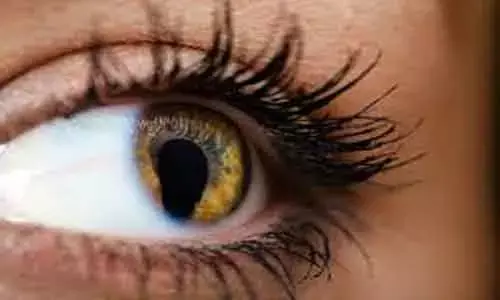- Home
- Medical news & Guidelines
- Anesthesiology
- Cardiology and CTVS
- Critical Care
- Dentistry
- Dermatology
- Diabetes and Endocrinology
- ENT
- Gastroenterology
- Medicine
- Nephrology
- Neurology
- Obstretics-Gynaecology
- Oncology
- Ophthalmology
- Orthopaedics
- Pediatrics-Neonatology
- Psychiatry
- Pulmonology
- Radiology
- Surgery
- Urology
- Laboratory Medicine
- Diet
- Nursing
- Paramedical
- Physiotherapy
- Health news
- Fact Check
- Bone Health Fact Check
- Brain Health Fact Check
- Cancer Related Fact Check
- Child Care Fact Check
- Dental and oral health fact check
- Diabetes and metabolic health fact check
- Diet and Nutrition Fact Check
- Eye and ENT Care Fact Check
- Fitness fact check
- Gut health fact check
- Heart health fact check
- Kidney health fact check
- Medical education fact check
- Men's health fact check
- Respiratory fact check
- Skin and hair care fact check
- Vaccine and Immunization fact check
- Women's health fact check
- AYUSH
- State News
- Andaman and Nicobar Islands
- Andhra Pradesh
- Arunachal Pradesh
- Assam
- Bihar
- Chandigarh
- Chattisgarh
- Dadra and Nagar Haveli
- Daman and Diu
- Delhi
- Goa
- Gujarat
- Haryana
- Himachal Pradesh
- Jammu & Kashmir
- Jharkhand
- Karnataka
- Kerala
- Ladakh
- Lakshadweep
- Madhya Pradesh
- Maharashtra
- Manipur
- Meghalaya
- Mizoram
- Nagaland
- Odisha
- Puducherry
- Punjab
- Rajasthan
- Sikkim
- Tamil Nadu
- Telangana
- Tripura
- Uttar Pradesh
- Uttrakhand
- West Bengal
- Medical Education
- Industry
CPS or FLACS yield similar results after 12 months of cataract surgery: Study

UK: There were no differences in postsurgery outcomes following 12 months of conventional phacoemulsification surgery (CPS) or femtosecond laser-assisted cataract surgery (FLACS), finds a recent study in the British Journal of Ophthalmology. The outcomes included vision, refraction, adverse postoperative events, or patient-reported outcome measures (PROMs).
Nick Stanojcic, Department of Ophthalmology, St.Thomas' Hospital, London, UK, and colleagues reported 12-month outcomes of randomized controlled trial comparing CPS with FLACS.
For this purpose, the researchers performed a single-centre, prospective single-masked randomized case-controlled trial. It included 400 patients who were randomized to CPS or FLACS with the LenSx platform (Alcon Laboratories Inc.). The researchers recorded visual acuity, refraction, central corneal thickness, endothelial cell loss (ECL), adverse events and quality of life outcomes, using EuroQOL 5-dimensions (EQ-5D-3 L) and cataract surgery patient-reported outcome measures (PROMs) questionnaires (Cat-PROM5).
Key findings of the study include:
- Two hundred and thirty four patients (58.5%) attended 12-month follow-up (116 FLACS, 118 CPS).
- Mean LogMAR unaided distance visual acuity) (±SD) was 0.12 with FLACS and 0.13 with CPS.
- Mean spherical equivalent (SE) refraction was −0.1±0.6 diopters (D) with FLACS and −0.2±0.6 D with CPS.
- Mean corrected distance visual acuity (±SD) was −0.01 with FLACS and 0 with CPS.
- Two patients per group underwent YAG laser capsulotomy for posterior capsular opacification (p=1).
- Mean ECL (per mm2±SD) was 301±320 with FLACS and 228±303 with CPS.
- Mean Cat-PROM scores (±SD) were −5.5 with FLACS and −5.8 with CPS.
- EQ5-3DL mean index score (±SD) was 0.92 with FLACS and 0.89 with CPS.
- Vector analysis comparing manual limbal relaxing incisions (LRIs) and intrastromal femtosecond laser-assisted astigmatic keratotomies (iFAKs) showed a greater correction index and smaller difference vector with iFAK.
"There were no differences in vision, refraction, adverse postoperative events or PROMs between FLACS and CPS groups at 12 months. iFAKs may provide more effective astigmatic correction compared to LRIs, 12 months postoperatively," wrote the authors.
Reference:
The study titled, "A randomised controlled trial comparing femtosecond laser-assisted cataract surgery versus conventional phacoemulsification surgery: 12-month results," is published in the British Journal of Ophthalmology.
DOI: https://bjo.bmj.com/content/early/2021/04/06/bjophthalmol-2020-316311
Dr Kamal Kant Kohli-MBBS, DTCD- a chest specialist with more than 30 years of practice and a flair for writing clinical articles, Dr Kamal Kant Kohli joined Medical Dialogues as a Chief Editor of Medical News. Besides writing articles, as an editor, he proofreads and verifies all the medical content published on Medical Dialogues including those coming from journals, studies,medical conferences,guidelines etc. Email: drkohli@medicaldialogues.in. Contact no. 011-43720751


